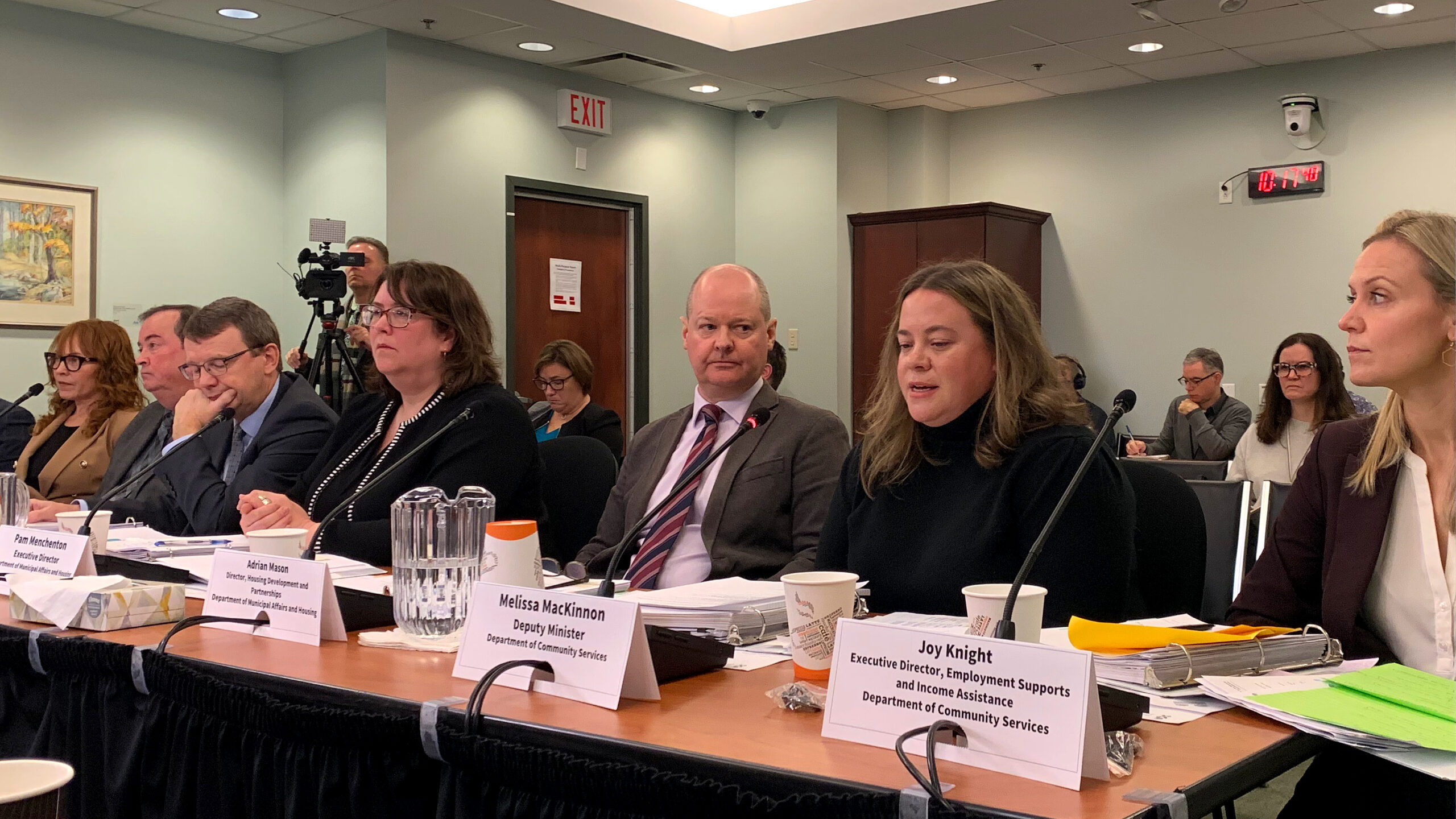Liberal Leader Churchill says government on the wrong track on housing
Liberal, NDP MLAs skeptical about government's market-oriented approach to housing crisis

caption
Bureaucrats face questioning on the government's housing strategy at Wednesday's public accounts meeting.Opposition MLAs criticized the government’s approach to housing affordability at Wednesday’s public accounts meeting.
“It’s not hyperbole to say there’s a housing crisis, there actually is one. The most acute symptom being the rapid rise in homelessness that we’re seeing,” said Liberal Opposition leader Zach Churchill.
Housing department officials faced questions from all three parties at the hearing. While it appeared as if everyone at the hearing agreed that affordable housing is an issue, the opposition and government couldn’t agree on much more.
Churchill criticized the government for not having a clear definition of what affordable housing is. But the chief bureaucrat in charge of housing for the provincial government said there can’t be one.
“The definition of affordable is dependent on the individual. So, there’s not going to be one definition … We’re not going to say this is what affordable means. The housing plan is meant to address the spectrum of problems,” said Byron Rafuse, deputy minister of the Department of Municipal Affairs and Housing.

caption
Liberal Leader Zach Churchill answers questions at a scrum after Wednesday’s public accounts meeting in Halifax.Churchill also said the government isn’t acting fast enough to provide affordable housing. “With the premier pushing to double the population, and with housing starts actually slowing down significantly in the province, how are we going to achieve affordable housing and a healthy vacancy rate, which would be at three per cent?” said Churchill.
Rafuse said the solution to the housing crisis was to build more housing.
“Until we get the supply up to where it should be, the market of supply and demand will dictate the housing issue … increased supply is the answer,” he said.
But some MLAs felt the government’s market-oriented housing approach would do little to serve the most vulnerable people right now.
“The fact is, is that if we build supply and we build population, there’s not going to be a trickle down. Because there’s going to be people going into those units at those market prices,” said NDP MLA Susan Leblanc.
“Yes, we need supply. Absolutely. Everybody needs supply. Will that in any meaningful timeline, drive down the price of housing? Not for any of the constituents that I have, or any of the people that I talked to around the province who are in core housing need,” said NDP Leader Claudia Chender.
“There are thousands and thousands of them, those people aren’t going to wait five years, they’re not going to wait 10 years, they’re not going to wait maybe 15 years for supply to drive down pricing,” she said.
Citing concerns about environmental impact and traffic congestion, Chender also questioned the government’s rationale for permitting residential development of about 2,000 units around Bedford’s Sandy Lake, an area encompassing 1,800 acres of wilderness.
“Sandy Lake represents thousands of potential units that were identified by the HRM staff. It is going through all the required environmental [and] transportation studies and the results of those studies will lead us to determine the forward path for Sandy Lake,” said Vicki Elliot Lopez, the province’s senior director of housing.
Chender also asked why there wasn’t a push for development on a vacant land parcel in Dartmouth Cove.
“I believe that there were significant issues identified with that piece of land that needed to be remediated before we move forward. But I can confirm I’m not aware of any plan on development that’s been in the works for a decade,” Lopez said.
Chender further inquired about development on the former sites of Bloomfield school, St. Patrick’s-Alexandra school and St. Patrick’s high school, and suggested a tax on vacant land might be appropriate.
Rafuse said that the government had no plans for a vacant land tax but highlighted other tools that he said incentivized building.
“Right now, we are going to continue down our roads, with our current programs to expedite processes to the panel, and to the developers to things like the GST rebate, and those mechanisms,” said Rafuse.
Housing in Nova Scotia has become an increasingly pressing issue. Rents are the fastest growing in the country, vacancy rates hover at 1 per cent and homelessness is increasing.
In response, the Tim Houston PC government promised 222 new public housing units in September and released its housing plan in October, which promised a $1 billion investment in housing to create the conditions for more than 40,000 new housing units.
The government has also introduced special planning areas, designated lands where the provincial housing minister can unilaterally approve developments in Halifax with the intention to speed up development.
Speaking to journalists after the meeting, Churchill said that he thought the government’s plan is insufficient for current needs.
“We’ve heard today that there’s no guarantee that the special planning areas are going to result in more affordable units. In fact, they’re probably going to result in more houses that are worth several hundred thousand dollars and townhouses that are half a million dollars more,” he said.
About the author
Giancarlo Cininni
Giancarlo Cininni is completing his fourth year of the BJH program. He has experience reporting in Brazil and Canada. When he is not staring...
